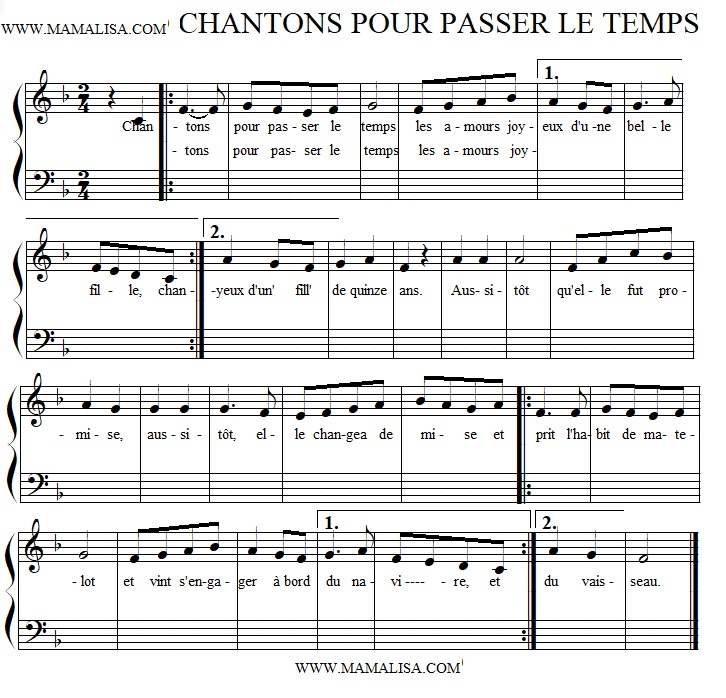Chantons pour passer le temps
This is an 18th century sea shanty from Normandy. Different versions of this song exist.
Chantons pour passer le temps
Let's Sing to Pass the Time
Chanson de marins
Sea Shanty
(French)
(English)
1. Chantons pour passer le temps
Les amours joyeux d'une belle fille
Chantons pour passer le temps
Les amours joyeux d'une fille de quinze ans.
Aussitôt qu'elle fut promise
Aussitôt elle changea de mise
Elle prit l'habit de matelot
Et vint s'embarquer à bord du navire
Elle prit l'habit de matelot
Et vint s'embarquer à bord du vaisseau.
2. Et le capitaine, enchanté (1)
D'avoir à son bord un si beau jeune homme
Lui dit : "Mon joli matelot,
Je t'engagerai à bord d' mon vaisseau.
Tes beaux yeux, ton joli visage,
Ta tournure et ton joli corsage
Me font toujours me rappeler
Z-à une beauté qui m'était promise.
Me font toujours me rappeler
Z-à une beauté que j'ai tant aimée.
3. – Monsieur, vous vous moquez de moi
Vous me badinez, vous me faites rire.
Je n'ai ni frères ni parents
Et j' suis embarquée au port de Lorient.
Je suis née z-à La Martinique
Et même je suis enfant unique
Et c'est un navire hollandais
Qui m'a débarquée au port de Boulogne,
Et c'est un navire hollandais
Qui m'a débarquée au port de Calais."
4. Ils ont ainsi vécu sept ans
Sur le même bateau sans se reconnaître.
Ils ont ainsi vécu sept ans
Se sont reconnus au débarquement.
"Puisqu'enfin l'amour nous rassemble
Nous allons nous marier ensemble.
L'argent que nous avons gagné
Il nous servira pour notre ménage.
L'argent que nous avons gagné
Il nous servira pour nous marier."
5. C'ti là qu'a fait cette chanson
C'est l' nommé Camus, gabier de misaine.
C'ti là qu'a fait cette chanson
C'est l' nommé Camus, gabier d'artimon.
Oh matelot, faut carguer la grand-voile,
Au cabestan, faudra qu' tout l' monde y soye.
Et vire, vire, vire donc,
Sans ça, t'auras rien dedans ta gamelle.
Et vire, vire, vire donc,
Sans ça, t'auras rien dedans ton bidon.
1. Let's sing to pass the time
The merry love story of a fine girl,
Let's sing to pass the time
The merry love story of a fifteen-year-old girl.
As soon as she was betrothed,
She changed her appearance,
She dressed as a sailor
And went to embark on the ship,
She dressed as a sailor
And went to embark on the vessel.
2. And the captain, delighted
To have such a handsome young man onboard
Told him, "My fine seaman,
I will enlist you on my vessel.
Your beautiful eyes, your pretty face,
Your elegance and your pretty chest
Always remind me
Of a beauty betrothed to me,
Always remind me
Of a beauty that I loved so much."
3. "Sir, you're making fun of me,
You're teasing me, you're making me laugh,
I have neither brothers nor parents
And I embarked at Lorient Harbor.
I was born in Martinique
And what's more, I'm an only child
And from a Dutch ship
I disembarked at Boulogne Harbor,
And from a Dutch ship
I disembarked at Calais Harbor."
4. They lived thus for seven years
On the same boat, without recognizing each other,
They lived thus for seven years,
They recognized each other when they disembarked.
"Since, at last, love brings us together,
We will get married.
The money we earned
Will serve our household,
The money we earned
Will serve to get married."
5. The one who made this song
Is the man named Camus, the foremast boatswain,
The one who made this song
Is the man named Camus, the mizzenmast boatswain.
Hey, seaman, we must furl the mainsail,
Everybody must be at the capstan.
And heave, heave, do heave,
Or you'll have nothing in your dish,
And heave, heave, do heave,
Or you'll have nothing in your can.
Notes
(1)Alternate verse:
Le capitaine du bâtiment
Était enchanté d'un si beau jeune homme
Le capitaine du bâtiment
Le fit appeler sur l' gaillard d'avant.
"Beau matelot, ton joli visage,
Tes cheveux et ton joli corsage
Me font toujours me souvenant
D'une jeun' beauté que j'ai tant aimée
Me font toujours me souvenant
D'une jeun' beauté du port de Lorient".
English Translation
The captain of the ship
Was delighted by such a fine young man,
The captain of the ship
Had him called to the forecastle.
"Handsome seaman, your pretty face,
Your hair and your pretty chest
Always keeps reminding me
Of a young beauty I loved so much,
Always keeps reminding me
Of a young beauty from Lorient Harbor."
General Notes:
-In the original 3rd verse, it can't be known when sung if a man or a woman is speaking because the verb is in the present perfect tense which belongs to the 1st conjugation group.
- Cahier de chants de marins, n°3 and Guide des chants de marins, Éditions Le Chasse-Marée Glénat, have an additional verse after the 3rd verse which is said to come from the Normandy tradition.
"Ils ont mis les voiles au vent,
Les canons tonnaient, on sonnait les cloches
Ils ont mis les voiles au vent,
Les vaisseaux partaient tous au même instant.
La belle sans peur a navigué sur l'onde
Sans demander que personne ne la seconde
Mettant le sabre à la main
Faisant son devoir comme un vrai marin,
Mettant le sabre à la main
Faisant son devoir comme un vrai marin."
English Translation:
They put the sails to the wind,
The cannons were booming, the bells were ringing,
They put the sails to the wind,
The vessels were all leaving at the same time.
The girl, without fear, sailed on the sea
Without asking for assistance,
Taking her saber in hand,
Doing her duty like a genuine seaman
Taking her saber in hand,
Doing her duty like a genuine seaman."
-The last verse is dedicated to the song's author as it used to be done some time in the past.
-"C'ti là" also found as "çui-là" is a colloquial form of "celui-là" (lit. that one). Some versions have it just as "celui" (standard word = the one).
Comments
"I learned this from my Mom (who doesn't know who she learned it from) and I always sang it to my students because I always loved the tune." -Monique


Thanks!
Thanks!
Thanks!
Thanks and Acknowledgements
Translation by Monique Palomares with Lisa Yannucci.


























